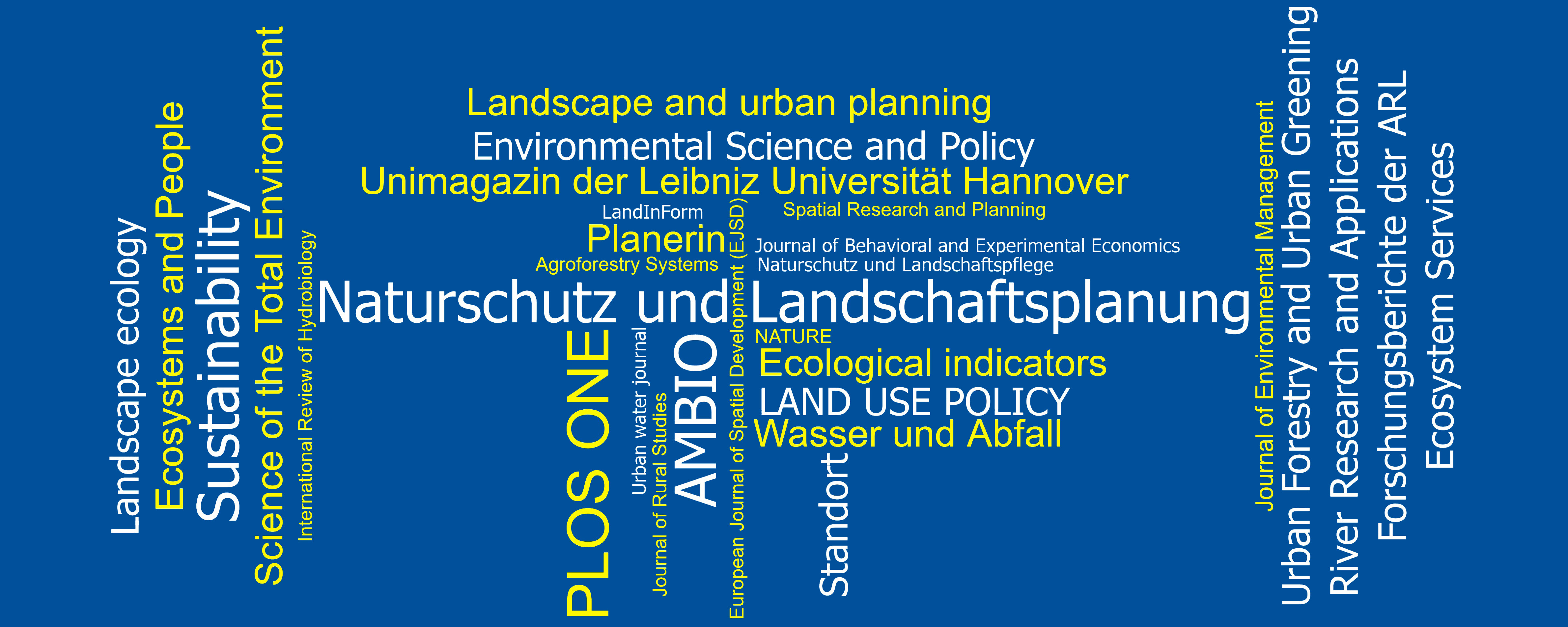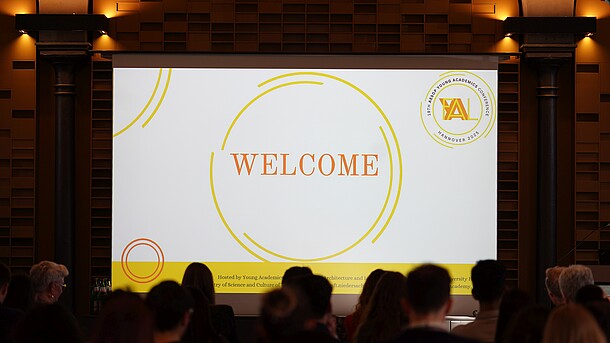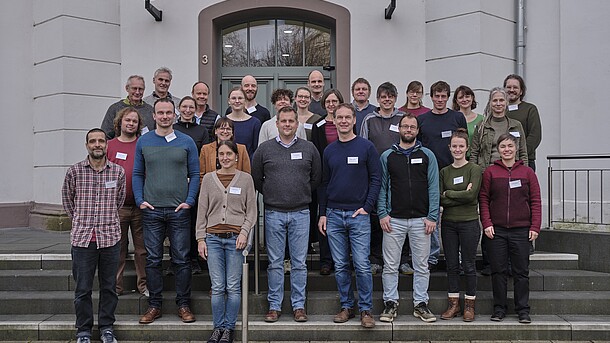Rückblick auf die ereignisreiche und inspirierende AESOP YA Konferenz 2025

SUCHE NACH PUBLIKATIONEN
Zeige Ergebnisse 481 - 500 von 1589
2019
Lange, L. (2019). Mehrörtige Lebensweisen in ländlichen Räumen: Ein unterschätztes Phänomen. Ländlicher Raum (Print), 70(2), 12 - 15.
Beermann, J., Halwachs, E., Kempa, D., von Malottky, B., Matthes, G., Moschner, S.-L., Musch, A.-K., Schaffrin, A., Schneider, J., Schreiber, S., Wist, S.-K., & Zehlius-Eckert, W. (2019). Miteinander reden. In S. Schön, C. Eismann, H. Wendt-Schwarzburg, & T. Ansmann (Hrsg.), Nachhaltige Landnutzung managen: Akteure beteiligen - Ideen entwickeln - Konflikte lösen (S. 49-62). wbv Media GmbH. https://doi.org/10.3278/6004699w
Greinke, L., Finger, A., & Kietzke, L. M. (2019). Mobilitätsvisionen – und wie war das mit dem Raum? Reflexion des Workshops des Jungen Forums zu räumlich-gesellschaftlichen Auswirkungen hochautomatisierten Fahrens. Nachrichten der ARL, 2019(1), 59-60. https://www.arl-net.de/system/files/media-shop/pdf/nachrichten/2019-1/nachrichten-2019-1.pdf
Mittrach, S., & Schlamelcher, M. S. (2019). Mülltourismus. Ansätze für einen verantwortungsvollen Umgang mit Plastikmüll. Praxis Geographie, 49(7/8), 59-63.
Hofmeister, S., Kanning, H., & Mölders, T. (2019). 'Natur' im Konzept Vorsorgendes Wirtschaften: Feministisch ökologische Perspektiven auf gesellschaftliche Natur- und Geschlechterverhältnisse. In U. Knobloch (Hrsg.), Ökonomie des Versorgens: Feministisch-kritische Wirtschaftstheorien im deutschsprachigen Raum (S. 222 – 251). Beltz Juventa.
Egger, G., Gräßer, L., Reich, M., Komposch, C., Dister, E., Schneider, E., & Müller, N. (2019). Ökosystem Alpenfluss: Konstant ist die Veränderung. In Flüsse der Alpen: Vielfalt in Natur und Kultur
Pusch, M. T., Podschun, S. A., Albert, C., Damm, C., Dehnhardt, A., Fischer, C., Fischer, H., Foeckler, F., Gelhaus, M., Gerstner, L., Iwanowski, J., Hoffmann, T. G., Mehl, D., Rayanov, M., Ritz, S., Rumm, A., Scholz, M., Stammel, B., Thiele, J., & Venohr, M. (2019). Ökosystemleistungen von Flussauen Bewerten: Der RESI-Ansatz. AuenMagazin, 2019(16), 6 - 10. https://www.researchgate.net/publication/334671245_OKOSYSTEMLEISTUNGEN_VON_FLUSSAUEN_BEWERTEN_DER_RESI-ANSATZ
Reich, M., Rüter, S., Niemann, K., Wix, N., Bredemeier, B., & Böttcher, M. (2019). Photovoltaik-Freiflächenanlagen und die Vernetzung von Lebensräumen an überörtlichen Verkehrswegen: Schlussbericht zum F+E-Vorhaben (FKZ 3515 82 3300). Institut für Umweltplanung, Leibniz Universität Hannover. https://doi.org/10.15488/16133
Galland, D., & Othengrafen, F. (2019). Planning at the National Level. In N. Green Leigh, S. P. French, S. Guhathakurta, & B. Stifel (Hrsg.), The Routledge Handbook of International Planning Education (1. Aufl.). Taylor and Francis Inc.. https://doi.org/10.4324/9781315661063-18
Kempa, D. (2019). Regiobranding - Ein nachhaltiger regionaler Entwicklungsprozess von Kulturlandschaften. Planerin, 2019(2), 19-21.
Knaps, F., & Herrmann, S. (2019). So einfach ist es nicht! Kritische Punkte zum Umgang mit kulturlandschaftsbezogener Identität in Place Branding-Prozessen. In S. Herrmann, & D. Kempa (Hrsg.), Regiobranding – nachhaltiges regionales Kulturlandschaftsbranding. (1. Aufl., S. 123-134). (Umwelt und Raum: Schriftenreihe Institut für Umweltplanung; Band 7). Cuvillier Verlag.
Schlattmann, A., & Rode, M. (2019). Spatial potential for paludicultures to reduce agricultural greenhouse gas emissions: an analytic tool. Mires and Peat, 25(Special Volume), 1-14. Artikel 03. https://doi.org/10.19189/MaP.2017.OMB.324
Danielzyk, R., & Jütte, K. (2019). Stadt, Land, Lebensräume: Gespräche mit dem Hannoveraner Professor für Raumentwicklung Rainer Danielzyk über lebenswerte Städte und wie die deutschen Metropolen 2050 aussehen werden. zeitzeichen : evangelische Kommentare zu Religion und Gesellschaft (druck), 20/12, 34-37. https://zeitzeichen.net/node/7972
Greinke, L., Lange, L., Othengrafen, F., Seitz, A., Albrecht, M., Lehmann, F., Gutsche, J.-M., & Glatthaar, M. (2019). TempALand: Ein Werkzeugkasten zum Umgang mit Multilokalität. Leibniz Universität Hannover. https://tempaland.org/wp-content/uploads/tempaland_startseite_werkzeugkasten.pdf
von Haaren, C., & Othengrafen, F. (2019). The Babel Fish Toolkit: Understanding and Using Behavioural Mechanisms and Interventions in Landscape Planning. DISP, 55(2), 22-35. https://doi.org/10.1080/02513625.2019.1630185
Wen, C. (2019). The elderly in green spaces: understanding, mapping, and planning for nature-based recreation. [Dissertation, Gottfried Wilhelm Leibniz Universität Hannover]. Leibniz Universität Hannover. https://doi.org/10.15488/5159
Sommer, C., Frisch, T., Stoltenberg, L., & Stors, N. (Hrsg.) (2019). Tourism and Everyday Life in the Contemporary City. (1. Aufl.) Routledge Taylor & Francis Group. https://doi.org/10.4324/9780429507168
Sommer, C., Stors, N., Stoltenberg, L., & Frisch, T. (2019). Tourism and Everyday Life in the Contemporary City: An Introduction. In C. Sommer, T. Frisch, L. Stoltenberg, & N. Stors (Hrsg.), Tourism and Everyday Life in the Contemporary City (1. Aufl., S. 1-23). Routledge Taylor & Francis Group. https://doi.org/10.4324/9780429507168-1
Danielzyk, R., Fina, S., Osterhage , F., Rönsch, J., Rusche, K., Siedentop, S., Zimmer-Hegmann, R., Fink, P., Hennicke, M., & Tiemann, H. (2019). Ungleiches Deutschland: Sozioökonomischer Disparitätenbericht 2019: Für ein besseres Morgen: Hintergründe zu Trends, Indikatoren, Analysen. Friedrich-Ebert-Stiftung. https://library.fes.de/pdf-files/fes/15400-20190528.pdf
Greinke, L., Snieg, F., Lava, R., & Pagonis, T. (2019). Urban Resilience, Governance and Climate Change: Coping with the consequences of climate change in Hanover, Germany. Institutionelles Repositorium Leibniz Universität Hannover. https://doi.org/10.15488/6745
Mitarbeiter:innen am Institut für Umweltplanung veröffentlichen auch Datensets zu ihren Publikationen und Forschungsprojekten. Unter dem Link gelangen Sie zum Forschungsportal der Leibniz Universität Hannover, das diese Datensets auflistet und zu den Speicherorten im Web verlinkt. Die Datensets sind in der Regel frei zugänglich (open access).






